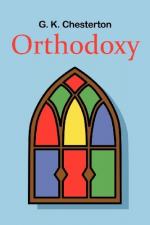
|
| Name: _________________________ | Period: ___________________ |
This test consists of 5 multiple choice questions, 5 short answer questions, and 10 short essay questions.
Multiple Choice Questions
1. According to Chesterton at the beginning of the first chapter, why did he write the book?
(a) Because he had to work through his religious beliefs.
(b) Because he had a well-crafted argument for Christianity.
(c) In response to a challenge.
(d) As a personal challenge to himself.
2. In the middle of Chapter One, why does Chesterton say this book is a joke on him?
(a) He does not take its content seriously.
(b) He went looking for something that is already known.
(c) No one around him agrees with his argument.
(d) He wrote it so he could win a bet.
3. How does the book look in relation to Chesterton, according to the author himself?
(a) Altruistic.
(b) Egotistical.
(c) Self-sufficient.
(d) Paltry.
4. When materialism leads a man to fatalism, what does it also accomplish, according to Chesterton?
(a) It also destroys his humanity.
(b) It cripples his free will.
(c) It acts as a liberating force.
(d) It also destroys his sense of hope.
5. In a person's pursuit for truth, what might happen, according to Chesterton?
(a) He searches for extraordinary truths.
(b) He finds great, unsearchable truths.
(c) He loses hope that truth exists.
(d) He loses hope that he, a mortal, can ever find the truth.
Short Answer Questions
1. What fact do religious men no longer accept as a foundational belief?
2. In Chapter III, The Suicide of Thought, how does a test of happiness compare to a test of the will?
3. What does Chesterton think is the only cure for madness?
4. What do art and ecstasy recall to us, in Chesterton's words? (Chesterton 2000, p.g 212)
5. What is the title of Chapter I?
Short Essay Questions
1. In Chapter IV, The Ethics of Elfland, what does Chesterton give as the first two principles of democracy? How does he convey a sense of wonder even in these principles?
2. In Chapter I, Introduction in Defense of Everything Else, Chesterton states that the book is written from his own experiences rather than as the result of research and labor. What expectations does this set up or destroy for the reader?
3. Chesterton assumes that he and his reader will share the common ground of agreeing that an interesting, active life is preferable to simple existence. Is this a fair starting point? Why or why not?
4. Chesterton ends Chapter II, The Maniac, with a look at the true skeptic. What picture does this man present? How does he relate to the man at the beginning of the chapter, the man who believed in himself?
5. Chesterton asserts that though the world has its share of evils, the modern virtues actually have a more devastating effect. How does he support this radical idea? What relationship does this have to Christianity?
6. Poetry is the only thing that keeps a man sane, while reason drives him insane. How does Chesterton support this argument, and is it plausible?
7. Materialistic fatalism has been credited with being merciful, though Chesterton says this is far from the truth. Why can fatalism not be merciful?
8. "But it is a much more massive and important fact that he [the materialist] is not free to raise, to curse, the thank, to justify, to urge, the punish, to resist temptation, to incite mobs, to make New Year resolutions, to pardon sinners, to rebuke tyrants, or even to say 'thank you' for the mustard" (Chesterton 2000, pg 185). What is the context for this statement? Does it logically follow from Chesterton's argument?
9. Materialism is a much narrower belief than Christianity, in fact, more than any religion. What reasons does Chesterton give for this? How does it relate to the discussion of madness and sanity?
10. In Chapter I, Introduction in Defense of Everything Else, Chesterton states that he hates the defense of something that cannot be proved or disproved. How is this important for the rest of the book?
|
This section contains 1,726 words (approx. 6 pages at 300 words per page) |

|




